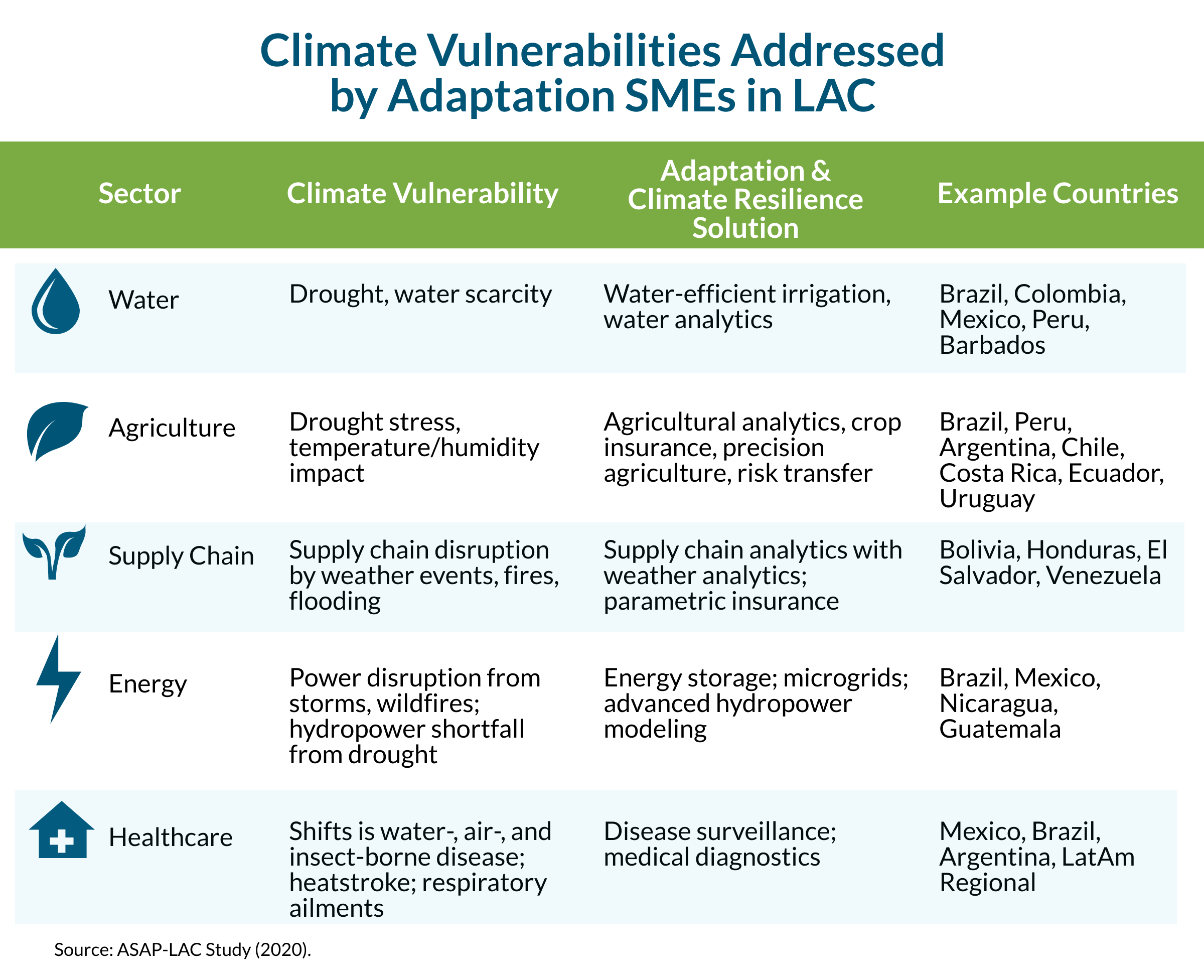The pandemic crisis illustrates our global economic and social fragility and the damage that could be caused by the climate crisis unless we act decisively now.
Latin America and the Caribbean is the second-most disaster-prone region in the world, with over 152 million people affected by 1,205 disasters since 2000. The region is already experiencing climate impacts including rising temperatures, more floods and droughts, and changes in the frequency and severity of extreme weather events – all of which disrupt the lives and jobs of the region’s citizens.
Support for companies providing resilience and climate solutions
SMEs, which generate at least 45% of employment and as much as 33% of GDP in developing countries, can play a key role as sources of innovation on adaptation, yet currently face financing, operational or capacity constraints hindering investment.
These enterprises can provide a solution to build broader resilience towards disruptions from various types of exogenous shocks. For example, a supply chain analytics company that uses customer data to better predict future supply and demand can help smooth disruptions caused by a pandemic.
To build climate resilience of SMEs and their supply chains and to foster investment in private resilience solutions through its Proadapt program, the IDB and IDB Lab worked with The Lightsmith Group, a private investment firm focused on climate resilience and adaptation, to conduct a LAC-Focused Adaptation SME Market Study (ASAP-LAC), which is a component of the Adaptation SME Accelerator Program (ASAP).
The findings from the study were captured in the report, The Adaptation SME Accelerator Program (ASAP): LAC-focused Adaptation SME market study, which will be published soon. The mapping exercise identified 216 SMEs across 15 LAC countries developing technologies and solutions for climate resilience and adaptation in multiple sectors such as agriculture, water, and energy.
ASAP, sponsored by the IDB, IDB Lab and the Global Environment Facility (GEF), completed this mapping exercise of SMEs in LAC as part of a global project to identify, convene, and scale up SMEs in developing countries that provide adaptation and climate resilience solutions.
The identified technologies, products and services ranged from remote sensing technologies for water-efficient irrigation, agricultural analytics platforms, technical consulting, disease surveillance, addressing key climate risks such as water scarcity, reduced food production and quality, and the spread of vector-borne diseases.
The number and diversity of these “Adaptation SMEs” identified through the study underscore the considerable diversity of climate adaptation and resilience solutions across industry sectors. ASAP seeks to build an ecosystem for SMEs in developing countries that have technologies, products, and services that can help to assess or address climate-related risks and impacts. Identifying and supporting the development and deployment of adaptation solutions by SMEs can help to overcome the institutional, technological, market, information barriers which currently limit adaptation investment.
A tool to identify resilience and adaptation solutions
Through an extensive consultation and review process involving leading climate experts, the ASAP project also developed a comprehensive taxonomy that builds on existing definitions and approaches to determine whether an SME qualifies as “Adaptation SME” based on the type(s) of technologies, products and services that it provides.
This taxonomy is a key tool for identifying and engaging with SMEs to provide targeted support. The framework is flexible, dynamic, applicable to any sector with broad application beyond the ASAP initiative.
The Adaptation Solutions Taxonomy – developed in partnership with the IDB, IDB Lab and the Global Environment Facility under ASAP – was launched at the Finance for Adaptation Solutions and Technologies Roundtable (FASTR) event at London Climate Week on July 2 and published on September 10 this year.

While critical first steps were made through the ASAP-LAC Study, more work is to be done. Companies expressed interest in participating in ASAP’s public database, regional events, and accelerators with targeted programming for Adaptation SMEs.
As many of the SMEs identified do not currently view their business as providing a solution to climate adaptation, continued outreach is necessary to grow this network and provide opportunity to scale adaptation and resilience solutions in LAC. Despite these ongoing challenges, the role of SME to develop technologies and solutions for climate resilience and adaptation is impressive and growing.
Further reading
Follow us on Twitter: @BIDcambioclima
Photo credit: Yves Alarie.


Leave a Reply